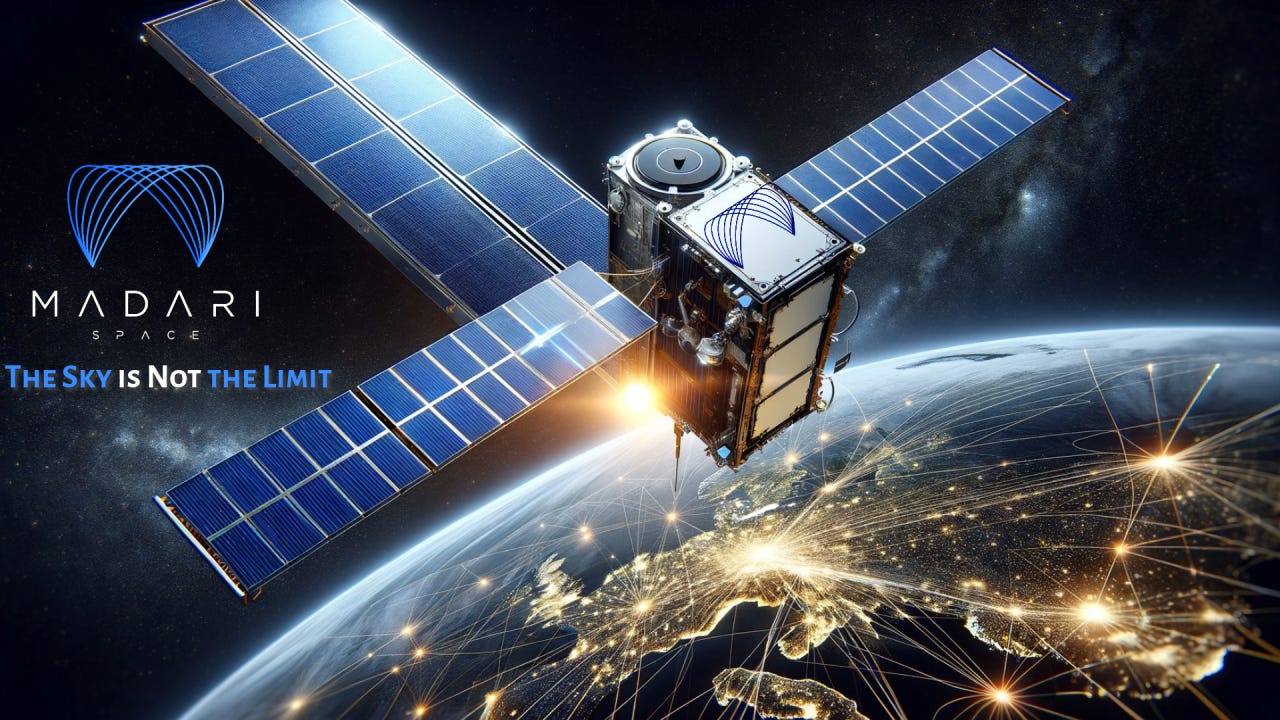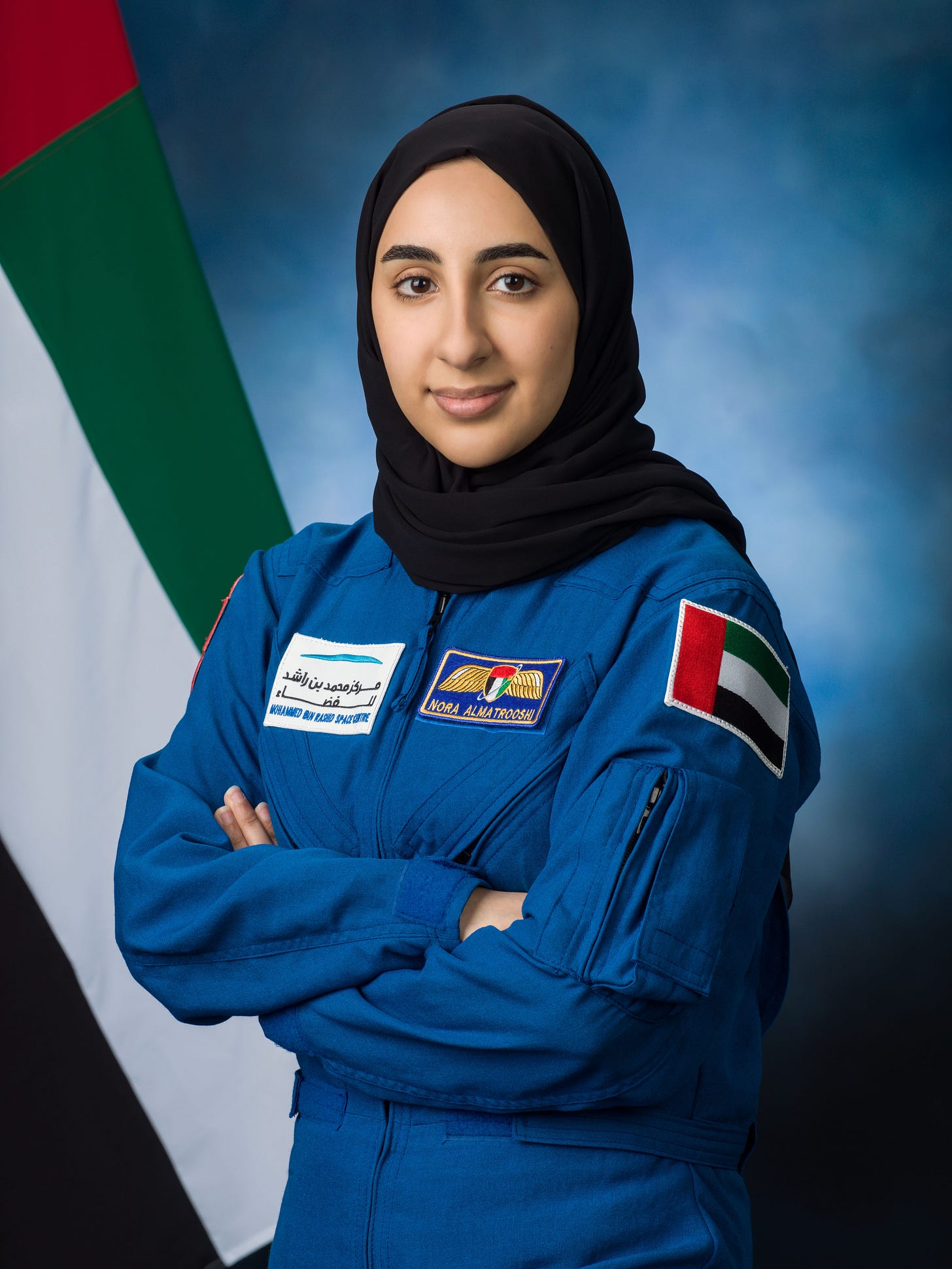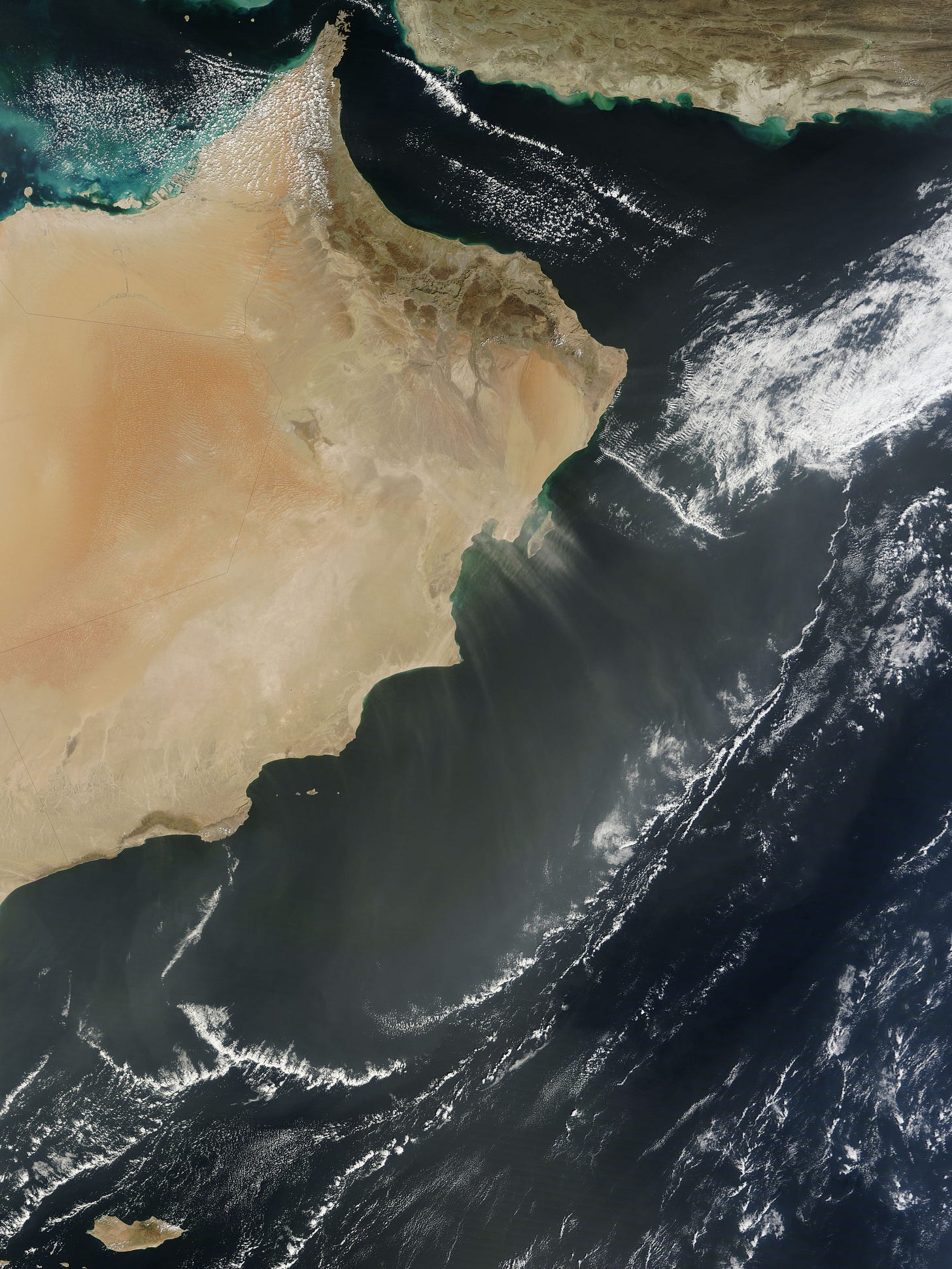Middle East Space Roundup: 25 November to 1 December 2024
A summary of all the space news in the Greater Middle East over the past week, brought to you by AzurX

The following are the major space developments in the Greater Middle East region tracked by Middle East Space Monitor over the past week:
UAE Space News
53rd ‘Eid Al Etihad’ UAE National Day: UAE Space Champions Awarded First Class Space Medals for Historic Achievements
Under the directives of H.H. Sheikh Mohamed bin Zayed Al Nahyan, President of the UAE and Supreme Commander of the Armed Forces, and as part of celebrations to mark the 53rd Eid Al Etihad, H.H. Sheikh Mohammed bin Rashid Al Maktoum, Vice President and Prime Minister of the UAE and Ruler of Dubai, in the presence of H.H. Sheikh Hamdan bin Mohammed bin Rashid Al Maktoum, Crown Prince of Dubai, Deputy Prime Minister and Minister of Defence of the UAE, and President of MBRSC awarded First Class Space Medals to five Emiratis in recognition of their significant contributions to the UAE’s space program. The honorees included UAE Astronauts H.E. Dr. Sultan AlNeyadi and Hazzaa AlMansoori, alongside H.E. Salem Humaid AlMarri (Director General, MBRSC), Adnan AlRais (Assistant Director General, Space Operations and Exploration Sector, MBRSC), and Dr. Hanan AlSuwaidi (Flight Surgeon).

Institutions like the Mohammed bin Rashid Space Centre (MBRSC) and the UAE Space Agency have propelled innovation, supporting a thriving private space sector and fostering future exploration. These awards celebrate national achievements and inspire the next generation to advance the UAE’s ambitions as a leading spacefaring nation.
UAE’s Madari Space Developing Space-Based Data Centres in LEO
Madari Space, a UAE-based startup, is working on an innovative solution to address the growing data management challenges by developing space-based data centres in low-Earth orbit (LEO). These centres aim to solve the environmental and operational issues faced by traditional Earth-based data centres, such as high energy consumption and latency. By leveraging space for data storage and edge computing, Madari Space plans to reduce the environmental impact of data processing, improve real-time data accessibility, and enhance security through blockchain-based infrastructure. Currently in the R&D phase, the company targets launching over 8,000 space-based data centres by 2028, with a compound annual growth rate of 5%. Madari Space plans to offer both subscription-based and on-demand services, targeting various industries including government and private sectors. Supported by the Mohammed Bin Rashid Innovation Fund (MBRIF) and Innovation Accelerator, the company benefits from UAE’s dynamic innovation ecosystem, which has provided access to vital resources and investment opportunities.
UAE’s MBRSC Signs Cooperation Agreement With Fujairah Emirate for Remote Sensing Services
A cooperation agreement was signed between various Fujairah Government departments and the Mohammed Bin Rashid Space Centre (MBRSC) to advance space technology projects in Fujairah and the UAE. The agreement, attended by H.H. Sheikh Mohammed bin Hamad bin Mohammed Al Sharqi, Crown Prince of Fujairah, aims to foster innovation in space, environmental sustainability, and technological development. It focuses on applying remote sensing and AI to support environmental and infrastructure monitoring, benefiting several government departments, including Fujairah Municipality, Civil Defence, and the Fujairah Natural Resources Corporation. The partnership is expected to enhance data sharing, collaboration, and knowledge exchange, supporting the UAE's broader goals of economic diversification and sustainable growth while reinforcing the role of space technology in advancing national projects.
UAE Astronaut Nora Al Matrooshi Celebrates Women in the UAE Space Sector
Nora Al Matrooshi, the first Emirati woman astronaut, underscored the pivotal role of Emirati women in the UAE's growing space sector, highlighting their significant contributions to major projects like the Hope Probe mission, where women comprised half of the engineering team. Speaking at the Global Women's Forum Dubai, Al Matrooshi emphasised that the UAE’s leadership has been instrumental in empowering women by providing them with the resources and opportunities needed to excel, particularly in STEM fields. She acknowledged that while global challenges persist for women in space-related sectors, the UAE has eliminated barriers, creating a model for other countries. Through initiatives and collaborations with entities like the Mohammed Bin Rashid Space Centre (MBRSC) and international universities, Emirati women are increasingly entering and excelling in technical disciplines such as engineering and computer science, paving the way for further advancements in space exploration.
Prominent American-Arab Space Scientist Lauds UAE Space Programme
Dr. Charles Elachi, former director of NASA's Jet Propulsion Laboratory, lauded the UAE's space achievements, particularly its role in the Artemis lunar Gateway programme, which he sees as placing the UAE among the "big league" of spacefaring countries. Elachi credited the UAE's investments, such as the Mars mission and the Emirates Airlock module for NASA's Gateway programme, as key drivyers of the country’s rising profile in space exploration. He also discussed the global space race, noting the importance of multinational collaboration, exemplified by NASA's partnerships with countries like the UAE, Canada, and Japan for the Gateway project. Elachi cautioned, however, that while ambitious plans for crewed Mars missions, such as those proposed by SpaceX, are exciting, they are likely to remain out of reach for at least two decades due to the immense technical, medical, and financial challenges involved. Despite the competition, he emphasised the importance of collaboration in space for technological innovation and fostering peaceful international relations, a sentiment underscored by his experience with past missions that benefited from global cooperation.
Planetary Society Produces Podcast on UAE’s Emirates Mission to the Asteroid Belt
The UAE Space Agency is progressing on its ambitious Emirates Mission to the Asteroid Belt, which will visit seven asteroids and culminate with a rendezvous with Justitia, the reddest object in the main asteroid belt. The mission team, led by Mohsen Al Awadhi and Hoor Al Hazmi, provided an update on their work, showcasing the UAE's growing capabilities in space exploration on a Planetary Society podcast hosted by Sarah Al-Ahmed. The project aims to advance scientific understanding of asteroids and further establish the UAE's presence in space. The podcast can be heard here.
Saudi Arabia Space News
Saudi Arabia’s CST Hosts Connecting the World From the Skies Forum
The international Connecting the World From the Skies forum, held under the patronage of Saudi Arabia’s Minister of Communications and Information Technology, Abdullah Al Swaha, brought together global experts and leaders in non-terrestrial networks (NTNs). The forum, supported by Saudi Arabia’s Communications, Space, and Technology Commission (CST), underscored the country’s commitment to advancing NTNs in alignment with sustainable development goals and addressing space debris. Key announcements included the launch of the Centre for Space Futures, the first NTN-focused centre under the World Economic Forum's Fourth Industrial Revolution network, and the unveiling of winners from the CST’s 6G NTN competition. Saudi Arabia's regulatory leadership, including its framework for NTNs and direct-to-device communications, was highlighted, alongside groundbreaking technical experiments like the Seamless D2D Connectivity trial. With participation from over 120 countries, the forum positioned Saudi Arabia as a key global player in technological innovation and NTN development.
Saudi Arabia, Brazil, & ITU Launch Study on Satellite Carrying Capacity of LEO
Saudi Arabia and Brazil, in collaboration with the International Telecommunication Union (ITU), are launching a joint study to evaluate the satellite carrying capacity of low-Earth orbit (LEO). This initiative is a response to growing concerns over the increasing number of satellite constellations, notably SpaceX’s Starlink, and the potential for future constellations to monopolise LEO. The study aims to assess when intervention may be necessary to ensure equitable access to these critical orbits, as satellite communications technology increasingly moves beyond government control, raising issues of space sustainability and fair distribution.
Viasat & Skylo Demonstrate D2D Cell Phone Satellite Connectivity in Saudi Arabia
Viasat has successfully demonstrated direct-to-device (D2D) satellite connectivity in Saudi Arabia, marking a significant technological milestone in the satellite messaging market. The demonstration, conducted during the Connecting the World from the Skies event in Riyadh, utilised Viasat’s L-band spacecraft and Skylo's NTN infrastructure to send two-way and SOS messages using a commercial Android smartphone. The D2D technology, which allows devices to connect directly to both terrestrial and satellite networks without additional hardware, follows 3GPP release 17 standards and operates within the already-licensed satellite spectrum, preventing interference with terrestrial networks. This success positions Viasat for future partnerships with mobile network operators in the region, although commercial deployment and revenue generation are still in early stages. While the demonstration showcases Viasat's technical capabilities and potential for market expansion in the Gulf and Asia-Pacific, it is considered a strategic positioning rather than an immediate revenue driver for the company.
Iran Space Developments
Iran Produces Super-Resolution Satellite Imagery From Its Omar Khayyam Earth Observation Satellite
The Iranian Space Research Center has achieved a significant milestone by producing super-resolution satellite images with a resolution of 35 to 45 centimeters, using data from the Omar Khayyam Earth observation satellite. This breakthrough, developed in collaboration with knowledge-based companies, utilises advanced pixel-breaking and processing techniques, eliminating the need for auxiliary data. These high-quality images offer substantial advantages in areas such as natural resource management, agriculture, urban planning, and environmental monitoring, providing superior alternatives to foreign satellite data in terms of cost, preparation time, and accessibility. This development reduces Iran’s dependency on external data and enhances the country's information and communication technology infrastructure. It also positions Iran as a regional leader in producing high-quality satellite imagery, with potential for international collaboration and export. Additionally, the success of the Omar Khayyam satellite, built and launched in 2022 by Russia, further underscores Iran's growing space capabilities, including recent achievements in launching domestically manufactured satellites.
Iran Building Multi-Payload Satellite to be Launched by Russia in Early 2026
Iran is set to launch a new satellite by 20 March 2026, in partnership with Russia, using a Soyuz rocket. This satellite, an optimised version of the recently launched Kowsar and Hodhod satellites, will combine imaging and Internet of Things (IoT) services. According to Hossein Shahrabi, CEO of Iranian knowledge-based company Omidfaza, the satellite will provide global coverage, making it particularly valuable for remote, forested, and mountainous areas where traditional connectivity is limited. This collaboration continues Iran's growing space cooperation with Russia, aimed at advancing both telecommunications and satellite-based IoT capabilities, with the new satellite slated to enhance global coverage and service reliability.
Iran’s Press TV Produces Video Profiling Iranian Space Sector
Iran’s Press TV produced a 25-minute video that profiles the Iranian space sector and can be viewed here:
Algeria Space Developments
Russia’s State Duma Ratifies Space Cooperation Agreement with Algeria
The Russian State Duma has ratified an agreement with Algeria, solidifying bilateral cooperation in peaceful space exploration. Signed in June 2023, the agreement aims to foster joint efforts in various space sectors, including satellite navigation, satellite communications, remote sensing, space science, and astrophysical research. It also outlines collaboration in training and education for space professionals, as well as providing spacecraft launch services and supporting crewed space flights. The agreement establishes a legal framework for cooperation, addressing issues like intellectual property protection, security, and customs procedures, further strengthening the growing space partnership between Russia and Algeria.
Russia Offers to Build Space Launch Sites in Algeria, Other African Countries
Roscosmos, Russia's state space corporation, is proposing the construction of spaceports in "friendly" countries, particularly in Africa, to enhance its space capabilities. Countries like Algeria, South Africa, and Zimbabwe are prime candidates due to their proximity to the equator, which offers significant advantages for rocket launches, including reduced fuel requirements and increased payload capacity. This is because rockets launched from equatorial locations benefit from the Earth’s rotational velocity and have direct access to geostationary orbits. Russia is expanding its cooperation with African countries, having signed agreements with Burkina Faso, Mali, Niger, and Algeria to develop satellite technologies, enhance national security, and foster peaceful space exploration. These efforts align with Russia's broader strategy to strengthen ties with African and Southeast Asian countries, positioning space as a crucial sector for international collaboration and influence.
Other Regional Space News
Oman Set to Launch Duqm-1 Sounding Rocket on 4 December 2024
Oman is set to conduct its first space rocket test launch, named Duqm-1, from the southern Duqm launch pad on 4 December 2024. This milestone, overseen by the Ministry of Transport, Communications and Information Technology (MTCIT) in collaboration with the National Aerospace Services Company (NASCOM), marks a significant advancement in Oman’s space ambitions. The rocket, measuring 6.5 meters and weighing 80kg without fuel, aims to reach an altitude of 140km, with the flight expected to last 15 minutes. While the test will not be open to the public due to security protocols, it represents a key step in Oman’s space development strategy. The country plans additional launches in 2025 and has established the Etlaq space launch complex to support future missions. Oman’s strategic location near the equator provides cost and time advantages for space launches, positioning the country to attract global investments and foster aerospace industry growth. This initiative is part of Oman’s broader efforts to enhance its space sector and create new business and employment opportunities.
Military Attachés Visit Azerbaijan’s Azercosmos Facilities
Military attachés from 15 countries visited the Main Ground Satellite Control Centre of Azercosmos, Azerbaijan’s space agency, as part of an event organised by the Ministry of Defence’s International Military Cooperation Department. The delegation of 17 military representatives toured the facility, where they were briefed on Azercosmos' infrastructure, history, ongoing projects, and future plans. The visit provided an opportunity for international military representatives to gain insight into Azerbaijan's space capabilities, followed by a Q&A session to address their inquiries.
Armenian Authorities Launch Investigation into Alleged ArmSat-1 Corruption
Armenian authorities have launched a corruption investigation into the ArmSat-1 satellite project, following concerns over potential financial mismanagement related to its May 2022 launch. The investigation, which casts a shadow on Armenia’s space ambitions, comes after an investment of $7 million in the project, and a subsequent satellite launch in 2023. Developed in collaboration with Spanish firm Satlantis and launched via SpaceX, ArmSat-1 was initially promoted by Prime Minister Nikol Pashinyan for its potential in border control, disaster management, and geological research. However, the satellite’s performance and the financial transparency of the project are now under scrutiny. The Anti-Corruption Committee has confirmed the investigation but withheld details due to state security concerns, while government officials have defended the satellite's utility, disputing allegations of data misuse.
Qatar’s Es’hailSat Adds Two New TV Channels to Its Video Distribution Lineup
Es'hailSat, Qatar's satellite company, has expanded its video distribution lineup by adding two new channels from Yafa Medya—Tayba TV and Al Tanasuh TV—at the 26° East orbital position on the Es'hail-2 satellite. Tayba TV provides a mix of religious, cultural, and educational programming in Arabic, focusing on family-friendly content, while Al Tanasuh TV promotes Islamic teachings and values, with a focus on societal reform through religious lectures and educational content. Es'hailSat's strategic coverage across the Middle East and North Africa (MENA) region enhances the viewership potential of these channels, further aligning with the company's commitment to delivering diverse cultural and Islamic content to meet regional demand.
Be sure to catch up with space activities in the region in the next edition of Middle East Space Monitor’s space roundup!






